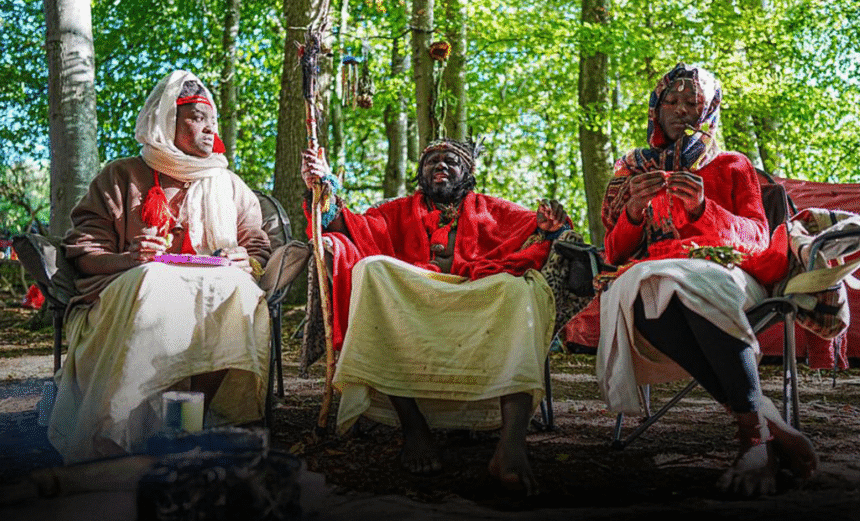A Scottish court has ordered the eviction of a self-proclaimed “African tribe” from woodland near Jedburgh, marking the latest twist in a highly unusual clash between ancestral identity claims and modern property law. The ruling, delivered at Jedburgh Sheriff Court, came after months of tension between the group who call themselves the Kingdom of Kubala and the land’s private owners. Sheriff Peter Paterson issued an immediate eviction order, granting sheriff officers and Police Scotland the authority to remove the occupants without delay. The decision underscores the limits of spiritual or historical land claims in the face of Scottish property law, while raising questions about cultural identity, displacement narratives, and community response.
The Kingdom of Kubala consists of three individuals: 36-year-old Kofi Offeh, who refers to himself as King Atehene; 43-year-old Zimbabwean blogger Jean Gasho, who calls herself Queen Nandi; and a young American, Kaura Taylor from Texas, who goes by the name Asnat and has described her role as a handmaiden in the service of the royal couple. Together, they had established a makeshift settlement in woodland outside Jedburgh, where they set up tents, signs, and symbolic markers claiming the land as their ancestral homeland. The group has made repeated statements rejecting the authority of the Scottish legal system, declaring instead that their right to the land derives from divine authority and centuries-old ancestral ties.
Central to their claim is the belief that the Kubala people were displaced from Scotland around four centuries ago, with their lineage stretching back to Africa and the Scottish Highlands. They insist that land was wrongfully taken from their forebears and that returning to the Borders represents both a spiritual duty and a reclamation of heritage. The group has said it will not use conventional currency or acknowledge local governance, arguing that such systems are incompatible with their sovereignty. Social media posts from the self-styled royals have reinforced their determination, with Queen Nandi writing that “nobody can stop Kubala,” while rejecting the sheriff’s jurisdiction as illegitimate.
The landowners, David and Mary Palmer, took legal action after repeated attempts to have the group leave voluntarily were unsuccessful. Their lawyer, Conner McConnell, argued that the Kubala had no legal title, tenancy, or occupancy rights, and that their refusal to comply with earlier deadlines left the owners no choice but to pursue eviction. Sheriff Paterson agreed, noting that the matter was one of clear ownership and the group’s assertions, while deeply held, carried no weight under Scottish law. On the morning of enforcement, sheriff officers supported by Police Scotland arrived at the site around 8 a.m. and dismantled parts of the camp. The eviction proceeded without arrests or violence.
Yet, rather than leaving the area entirely, the Kingdom of Kubala simply moved a few metres, crossing a wire fence and setting up a new camp still within woodland nearby. Their relocation has prompted fresh complications, as the land they have moved onto belongs to another, as-yet-unconfirmed owner. Deputy council leader Scott Hamilton has said the council is now investigating land ownership and may take further legal action once it is clarified. For now, the group remains encamped, still flying their banner of sovereignty and rejecting the sheriff court’s verdict. Authorities stress that the process is ongoing and will be handled through lawful channels.
Public reaction in Jedburgh and beyond has been mixed. Some locals view the Kubalas’ presence as a curiosity or a bizarre performance of identity politics, while others have raised concerns about property rights, welfare, and the strain on local resources. Supporters of the group frame their actions as a stand against colonial dispossession, pointing to broader conversations about indigenous claims and displaced peoples worldwide. However, no formal recognition of their historical assertions has been made by academic institutions or heritage bodies. Importantly, UNESCO is not involved in the case; the woodland is not part of a World Heritage Site or any UNESCO-protected area, despite some online speculation.
The eviction order illustrates a broader tension between belief and law. While Scotland recognises and celebrates diverse cultural heritages, its legal framework rests firmly on documented ownership and statutory rights. In this context, the Kingdom of Kubala’s claims, however sincerely made, fall outside the protections that international law or heritage conventions might afford displaced communities. Unless evidence of historical title emerges, a prospect considered unlikely, the courts will continue to treat the matter as a straightforward case of unlawful occupation.
For now, the saga continues. With eviction from the first site completed but the group still nearby, authorities face the prospect of repeating legal processes unless the Kubala choose to leave voluntarily. The episode has drawn significant media attention, both for its unusual circumstances and for the way it raises deeper questions about history, belonging, and the limits of sovereign self-definition. Whether seen as a protest, a performance, or a genuine spiritual mission, the Kingdom of Kubala has ensured its story will not be quickly forgotten in Jedburgh.


















